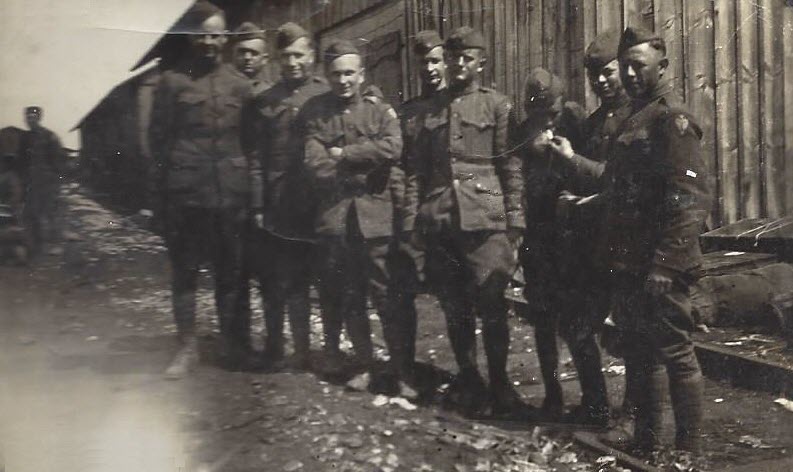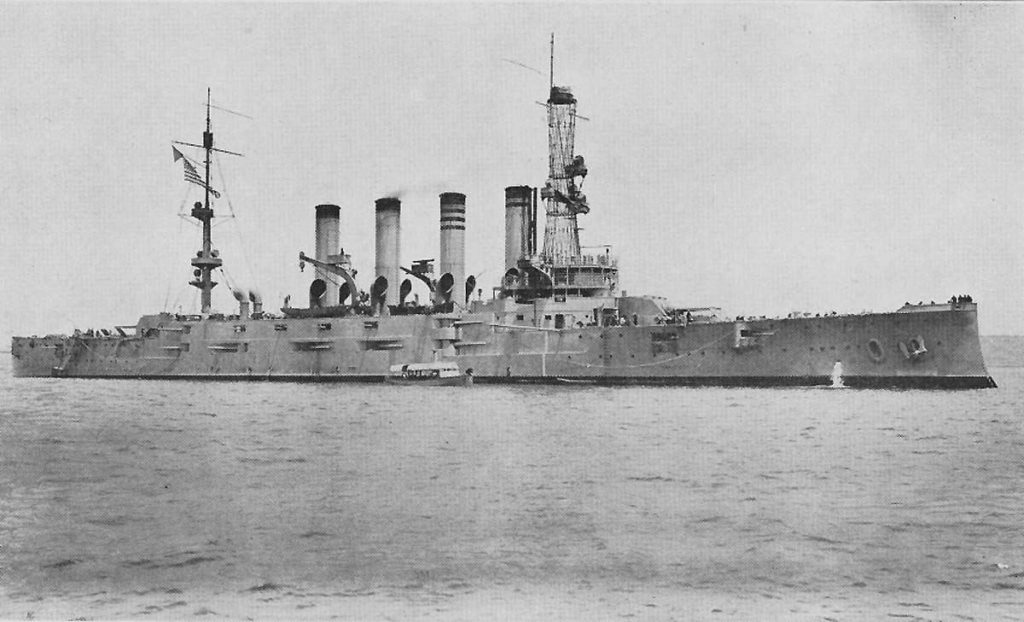
Two weeks after they had moved to Le Mans, the 36th Infantry Division began to move to port. Soldiers of the 142nd Infantry Regiment, quartered just outside Le Mans in and around the town of Savigné l’Évêque, boarded American trains on May 17, 1919. The American boxcars were much larger than the French 40-and-8s (40 Hommes/8 Chevaux). The rail journey took the men overnight to their port of embarkation, Brest.

Brest was the port of embarkation for the entire division. The rest camp at Pontanézen was uphill from the old port town. It was remembered negatively by those soldiers who had passed through it about nine months before. For example, it was primitive and the men had to sleep in a cow pasture. Returning in 1919, the 36th found it much enlarged and improved.

Au revoir
The 142nd Infantry barely got to know Pontanézen as they spent about twenty-four hours in it. They arrived on May 18 at 2 p.m. and, after the ritual delousing exercise, spent the night. By 4 p.m. the next day the whole regiment was on the dock at Brest, waiting to board ship. Most of the regiment boarded the old Navy cruiser, USS Pueblo. The 3rd Battalion boarded the British troopship, RMS Saxonia.
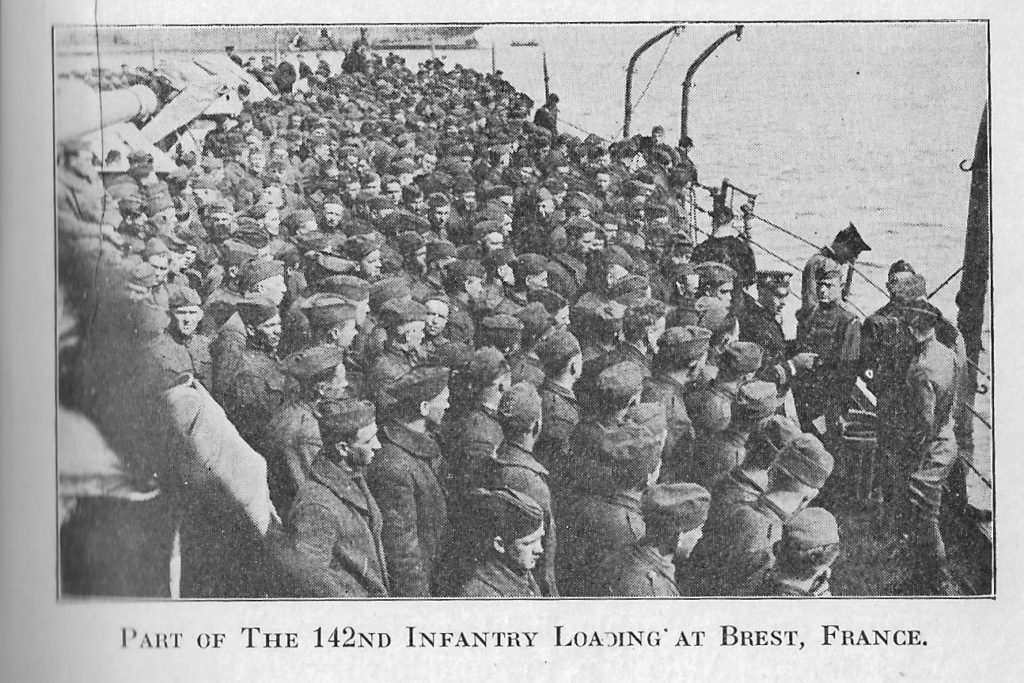
Pueblo and Saxonia left port that day, May 19. It was a bittersweet moment for the men of the 142nd Infantry. Buried in the old battlefield were nearly 200 of their comrades. In addition, the regiment had experienced the rigors of combat and the stresses of post-war deployment far from home. A number of the officers had requested reassignment to Germany in the Army of Occupation. Further, some officers were reassigned from the 36th Division to other Army units in France. These officers had a choice whether to stay or go home, but many stayed. However, only a small number of enlisted men from the 36th Division re-upped for more duty in Europe with the Army.

“All engines stop!”
The next day, May 20, the Pueblo was steaming homeward. The sun was out, and many men were on deck relaxing. A rogue wave crashed over the bow, sending men across the deck grasping parts of the ship. There were several injuries. Then two men were seen in the water. Life rings were thrown out to them. The Pueblo stopped. Sailors quickly lowered the lifeboats and rowed out to where the men were last seen. Subsequently they returned with the body of Corporal Harry S. Hovey, of E Company. After searching in rough seas for nearly an hour, the lifeboats returned to the Pueblo.
A roll call of everyone aboard ship revealed that Private Joseph C. Strong of Clarendon, Texas was missing, now lost at sea. Rough seas continued for much of the journey. As a result, hatches remained closed and the men were not allowed on deck until May 25th. The sea becalmed, a memorial service was held on deck on the 25th for Corporal Hovey and Private Strong.
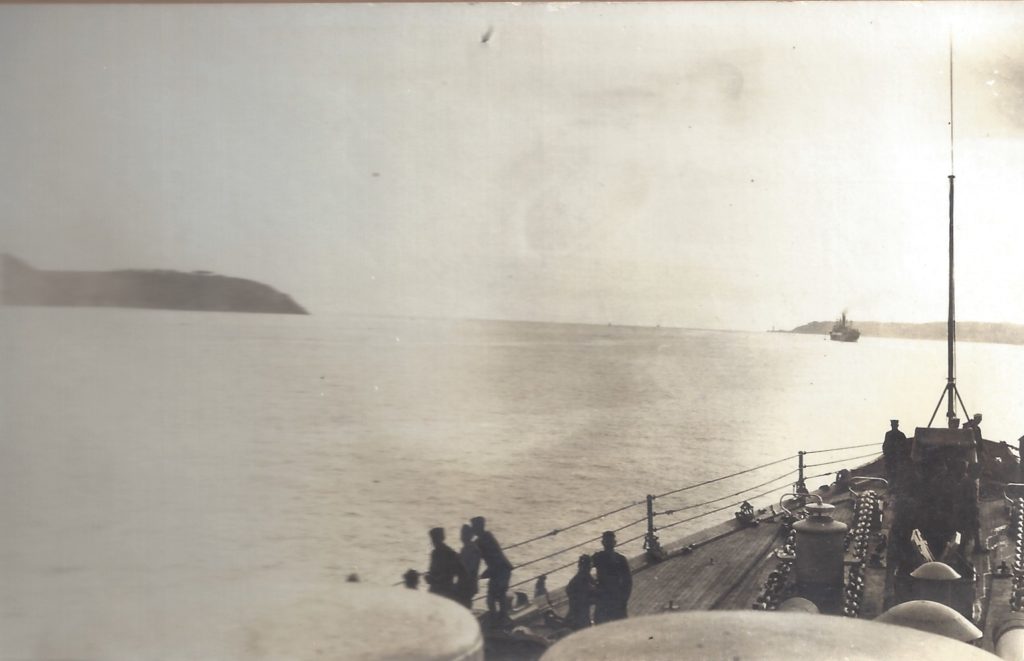
The Golden Door
By May 30, soldiers on deck of the Pueblo could see a difference in the sky before them. Birds flew overhead; the air smelled different. At dawn on May 31st, USS Pueblo approached New York Harbor. As they sailed past the Statue of Liberty and into the Hudson River, a small craft came alongside with a banner that read “OKLAHOMA”. Congressmen Jim McClintic and E. B. Howard, both of Oklahoma, were on board. McClintic greeted the crowd gathered on deck through a megaphone, “we are darn glad you are here and we will give you a big blowout in Oklahoma City.”
The Pueblo reached Hoboken and docked at 9:15 a.m. on May 31st. The RMS Saxonia had docked there on May 30. After ten and a half months, soldiers of the 142nd were on American soil once more. Most of the 36th Infantry Division disembarked at Hoboken, New Jersey. However, the 143rd Infantry Regiment entered the United States at Newport News, Virginia.
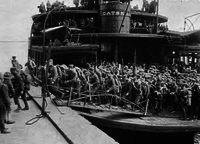
Once ashore, the 142nd Infantry were transported by ferry up the Hudson River to Alpine Landing and had to march five miles to Camp Merritt, NJ. Greeting them there at Camp Merritt was a long line for the “decootieizer”, the bane of every soldier’s existence. The war against lice finally over, the men of the 142nd Infantry marched to the mess hall and then to bed on their first night back in America.
